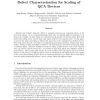Free Online Productivity Tools
i2Speak
i2Symbol
i2OCR
iTex2Img
iWeb2Print
iWeb2Shot
i2Type
iPdf2Split
iPdf2Merge
i2Bopomofo
i2Arabic
i2Style
i2Image
i2PDF
iLatex2Rtf
Sci2ools
118
click to vote
DFT
2004
IEEE
2004
IEEE
Defect Characterization for Scaling of QCA Devices
Quantum dot Cellular Automata (QCA) is amongst promising new computing scheme in the nano-scale regimes. As an emerging technology, QCA relies on radically different operations in its devices; for example, the logic values are represented by the position of electrons inside QCA cells rather than voltage levels, and the basic logic block of QCA is the majority voter. In this paper, we present the impact of scaling on defects that may arise in the manufacturing of QCA devices. This study shows how the sensitivity to manufacturing processing variations changes with device scaling. Scaling in QCA technology is related to cell dimension/size and cell-to-cell spacing within a Cartesian layout. Extensive simulation results on scaling of QCA devices, such as the majority voter, the inverter and the binary wire, are provided to show that defects have definitive trends in their behavior. These trends relate cell size (l) to the smallest cell-to-cell spacing (d) for erroneous behavior in the pre...
DFT 2004 | Majority Voter | QCA Cells | Qca Devices | VLSI |
| Added | 20 Aug 2010 |
| Updated | 20 Aug 2010 |
| Type | Conference |
| Year | 2004 |
| Where | DFT |
| Authors | Jing Huang, Mariam Momenzadeh, Mehdi Baradaran Tahoori, Fabrizio Lombardi |
Comments (0)

